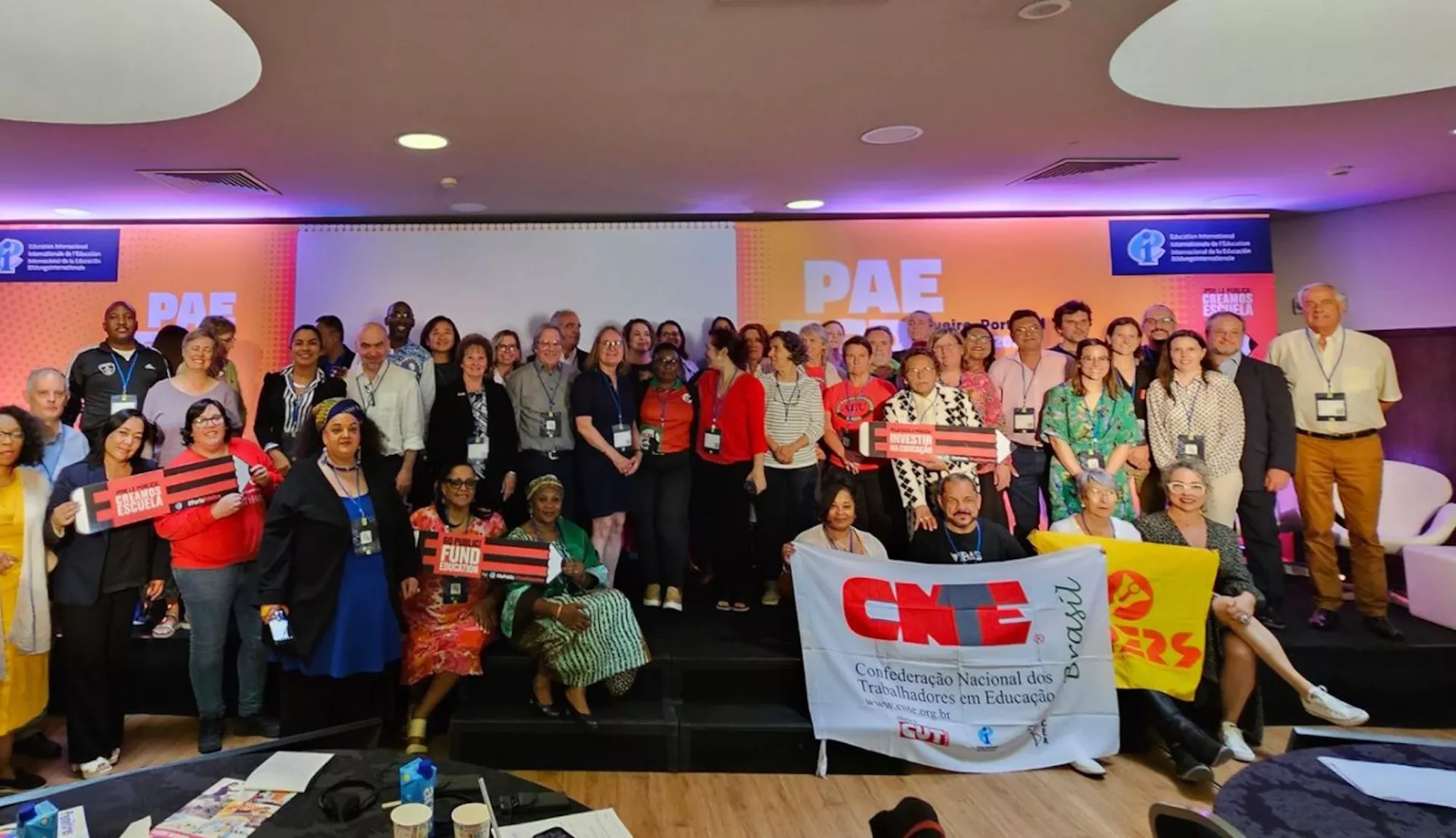
Key Takeaways
- ESPs around the world share the common struggle of earning respect and livable wages for the critical work they do for students and schools.
- The two-day World ESP Conference brought ESPs together to build union solidarity and defend the rights of ESPs.
- As part of the work of the conference, Education International launched a campaign, Go Public! Fund Education, urging governments to invest more in schools and ESPs.
Debra Ward-Mitchell, an Illinois paraeducator, longtime union leader and 2022 Education Support Professional (ESP) of the Year has had many opportunities to raise awareness, recognition, and respect for ESPs around the country. This year, she had the opportunity to share it on a world stage.
Ward-Mitchell one of several American ESP members who represented the National Education Association at Education International’s World ESP Conference, Building Union Power: Defending the Rights and Status of Education Support Personnel, held in Aveiro, Portugal.
The conference, which opened on May 16, World ESP Day, was co-hosted by EI member Federação Nacional da Educação (FNE), and brought together education union activists from around the world to exchange ideas, join in solidarity, and build power across the globe to defend ESPs.
“We need to begin by earning respect for our profession,” Ward-Mitchell, who participated in a panel about defending ESP status and rights, said. “It can help us get higher pay, better working conditions, and training, but it must start with respect.”
The theme of respect and recognition for school support staff, as well as the need for more training and professional development, was shared by each of the participating countries, including those from Africa, Asia, Australia, Canada, central and south America, Europe, and New Zealand.
Education unions from around the world also demand higher wages to meet the needs of their students. To kickstart the process, Education International (EI) recently launched Go Public! Fund Education, a campaign that calls on governments to invest more in ESPs and in public education.
In her welcome message to participants, EI President Susan Hopgood said, “education support personnel are the beating heart of education institutions everywhere.”
She warned that, “with austerity measures set to impact 85% of the world’s population by the end of the year, public education is under attack and education support personnel are particularly impacted. Shrinking budgets mean layoffs, increasing privatization and deteriorating working conditions. It is not only the workers that are affected, but the students, too.”
“The global education union movement demands thatt the labor rights of Education Support Personnel are guaranteed. And we demand that governments take concrete policy steps to enhance their status,” she said.
Lois Yukna, president of the National Council for Education Support Professionals, facilitated a roundtable on ESPs and early childhood education. She said the conference brought ESPs from around the world together to share best practices, learn new skills, and reimagine their professional development and how they support students in their nation’s worksites.
“No matter where Education Support Professionals are around the world, we share common challenges, attacks and demands on our professions. And because of that, we must remain resilient, united and organized,” Yukna said.
At the close of the conference, the global education unionists passed a statement that not only reaffirms EI’s Declaration of Rights and Status of Education Support Personnel, but also calls upon governments to:
- Urgently increase investment in public education in line with international targets and the Transforming Education Summit Call to Action on Financing;
- Invest in sufficient numbers of trained and qualified education support personnel that have quality working conditions, salaries that enable a life with dignity, and quality career pathways;
- Provide education support personnel with quality training and free professional development opportunities according to their needs;
- Increase the attractiveness of a career as an education support worker;
- Take concrete actions to enhance the status of education support personnel and ensure that they are recognized as part of the education community;
- Ensure gender pay equity;
- Halt and reverse the privatization of education and the outsourcing of education support personnel roles to contractors;
- Ensure that education support personnel have secure and permanent positions, with access to full-time employment;
- Ratify and implement Convention C190 to ensure education support personnel are safe from all forms of violence including gender-based violence in the workplace;
- Ensure a just transition in the education sector by protecting education support personnel’s safety and labor rights in the context of the worsening impacts of the climate crisis;
- Collaborate with education support personnel and their unions to define how information technologies can support their work, and provide high quality training on how to use them effectively;
- Respect the labor rights of education support personnel and their right to join unions;
- Respect trade union rights, including the right to organize, bargain collectively, and strike, as well as engage in meaningful social dialogue with organizations representing education support personnel.
Janie White, Vice President of Washington Education Association, who presented NEA research on ESPs across America, emphasized that we must leverage what we know about ESPs to help organize, engage and support them.
“The World ESP Conference offers a tremendous opportunity to share the common struggles and goals of ESPs and to work together to build and sustain these essential education professionals,” she said.
